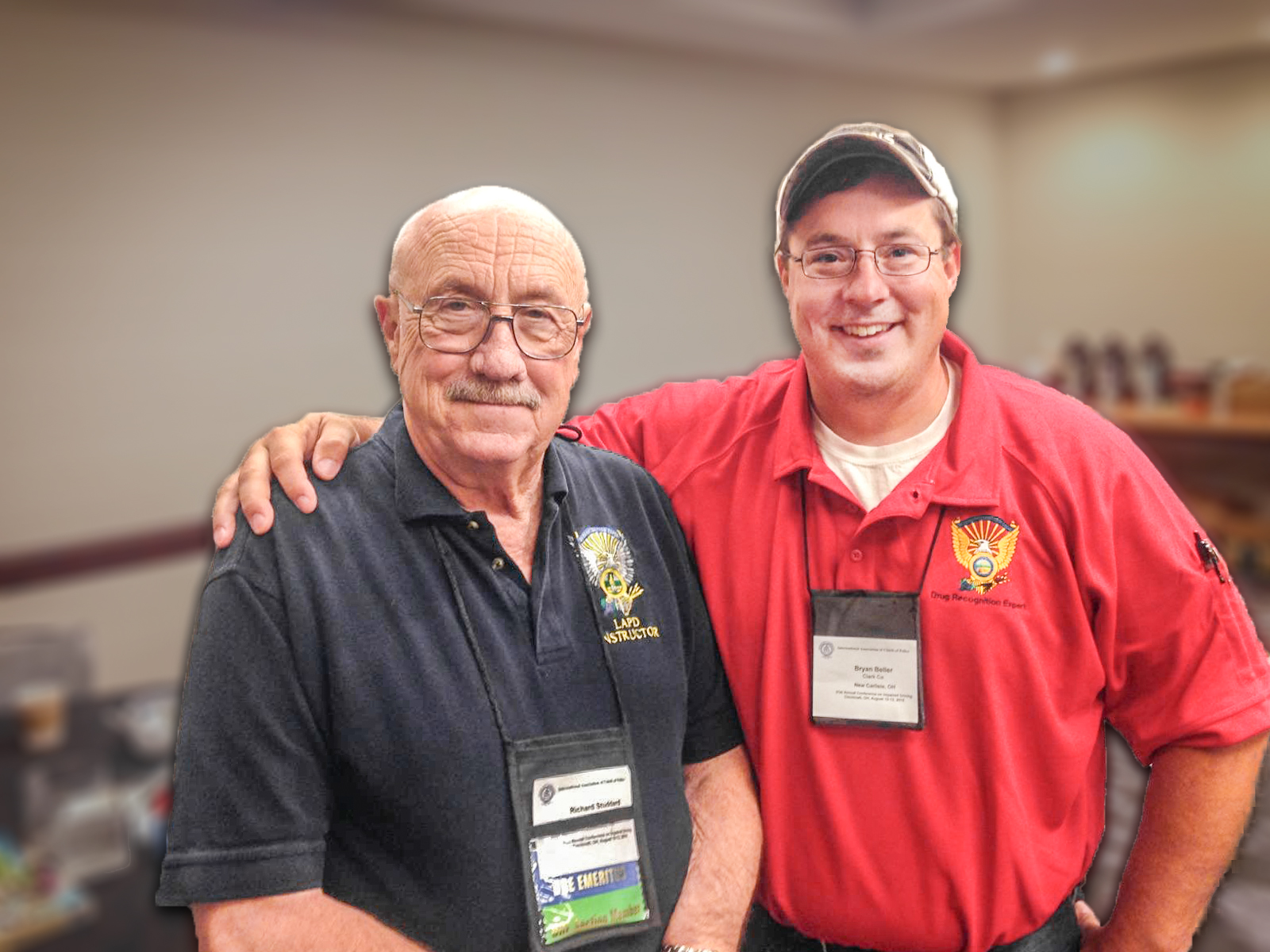 Retired LAPD Sgt. Dick Studdard (L) and Clark County Sheriff’s Deputy Brian Beller (R) at a recent DRE conference in Cincinnati. Studdard is one of the originators of the DRE Program.
Retired LAPD Sgt. Dick Studdard (L) and Clark County Sheriff’s Deputy Brian Beller (R) at a recent DRE conference in Cincinnati. Studdard is one of the originators of the DRE Program.
A drug recognition expert or drug recognition evaluator (DRE) is a police officer trained to recognize impairment in drivers under the influence of drugs other than, or in addition to, alcohol.
Clark County Sheriff’s Deputy Bryan Beller transferred out of New Carlisle this year to return to the road patrol. Beller is the only Drug Recognition Expert in our area besides a few Ohio State Patrol officers.
Beller is under contract with the Ohio Department of Public Safety and is dispatched to locations where the use of drugs is suspected. Although he works for Clark County, this agreement requires that the sheriff “lend him out” if other agencies around the Miami Valley need his expertise. Beller has been involved in cases in both Fairborn and Montgomery County in the past.
Beller received his training as part of The International Drug Evaluation and Classification Program. In the mid 70s, the Los Angeles Police Department started the program when officers noticed that many of the arrests made for DUI actually had very low or no alcohol concentrations. The officers reasoned that the arrests were more likely for drug use, but their lack of knowledge and skills to support their suspicions needed to be addressed. Two sergeants from LAPD collaborated with medical doctors, research psychologists and other professionals to develop a standardized procedure for officers to use in recognizing drug influence and impairment. In 1979 the program was officially recognized by LAPD and the first Drug Recognition Expert (DRE) program began.
In 1987 The National Highway Traffic Safety Administration began the DEC programs as pilots in Arizona Colorado, New York and Virginia. In the late 80’s Utah, California and Indiana joined the program and in 2012 Ohio finally adopted the program which is now in all 50 states including the District of Columbia. Canada has also embraced the program.
During our interview with Deputy Beller, he stated “I can’t just look at someone and tell what drug they are on,” but he can perform an “assessment” that indicates whether he is dealing with a depressant or a stimulant.
A case in Arizona that came before the Supreme Court supports the DRE program and allows findings to be admissible in court cases.
Beller noted that the findings are documented by blood and urine tests. The majority of findings are for marijuana and prescription drugs which are the leading drug problem in Ohio. Pill mills are located throughout the state. Heroin and Meth are increasing in occurrence during routine OVI stops.
In Ohio there are approximately 118 DRE trained officers. The majority are employed by the OSP leaving Beller to be the only officer in our area with the advanced training. In 2014 he made over 70 OVI arrests. His numbers appear to be increasing this year as drug use is increasing in our community. Over Labor Day weekend, the deputy was assigned to Bethel Township where he made 14 arrests.
When making a stop, Beller is looking for specific indications of drug use. The lack of the odor of alcohol is often the first clue to an officer when making a stop and conducting the standard test for impairment. Beller explained that when officers make an OVI arrest, they are often tied up with reports and following up with the biological testing to confirm the type of substance involved. This keeps the officers away from taking other calls, but the safety of the community is part of their job to stop accidents before they happen with impaired drivers.
The training that Beller has also makes him a valuable asset when law enforcement is involved with an assault call or in the evaluation of a scene where drugs are suspected.
Sadly Beller is also often called to the scene of a fatality where drugs and alcohol are suspected. In the case a year ago on Dayton Road in Mad River Township where a grandfather and granddaughter lost their lives in an OVI accident, Beller was called to the scene. He also participated in the investigation at the site of the accident that claimed the life of a young man from Possum School earlier this summer.
Beller explained that once a DRE is called to a scene, they can be at the hospital for hours while the individual is tested and charges are considered. DRE officers work closely with the prosecutors as part of their work load.
DRE trained officers learn to understand the biological effects of drugs on the human body. They are taking advanced courses regarding drug impairment to increase their knowledge base that adds value to their services. Beller noted that he would like to see other law enforcement agencies around our area take advantage of the program. He would also like to see an increase in the number of OVI suspected drivers being pulled over to prevent accidents such as those fatal incidents in our area and around the country.
Beller is certified to conduct trainings with law enforcement departments and is willing to make arrangements to conduct trainings at locations throughout the Miami Valley. Being just one of 118 DRE trained officers around Ohio creates a high demand for his services. When a DRE officer is needed, a text is out and Beller is assigned to a certain area of the state.
Deputy Beller has seen much in his career and noted that any incident involving children is especially hard for all first responders involved. Clark County is fortunate to have someone who had an interest in learning more about the DRE program. We are also fortunate that Sheriff Kelly wrote his letter of support for the program and that his application was approved.
Beller brings awareness to the community and is also willing to speak to citizens on how they can recognize drug activity and report it to their law enforcement agency in hopes of stopping the trafficking of drugs in our community.

